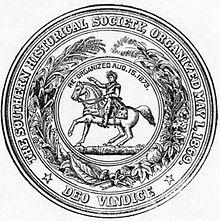 Seal of the Southern Historical Society, designed by Robert A. Brock in 1888.[1] | |
| Motto | Latin: Deo vindice |
|---|---|
| Formation | May 1, 1869 |
| Founder | Dabney H. Maury |
| Founded at | New Orleans |
| Headquarters | Richmond, Virginia |
Region served | Southern United States |
The Southern Historical Society was a major historical archive specializing in the Southern history. The society first organized on May 1, 1869, at New Orleans.
History
The Southern Historical Society was founded on April 15, 1869, at New Orleans, by Maj. Gen. Dabney H. Maury to preserve the records and incidents of the American Civil War.[2] He and the eight other founding members donated family papers, books, and artifacts to the Society to form its initial collection. Its first manuscript was published in 1876, continuing until 1959. The society organized on May 1, 1869; signatories included Gen. Braxton Bragg, Maj. J. E. Austin, Maj. Gen. Dabney H. Maury, Maj. B. M. Harrod, Lieut. Gen. Simon Bolivar Buckner, Capt. S. H. Buck, Col. A. L. Stuart, Capt. George Norton, and Mr. C. L. C. Dupuy.
As originally organized, the Society had a President and Secretary/Treasurer (the only paid positions). Vice-presidents for each former Confederate state, plus the border states of Maryland, Tennessee, Kentucky and the District of Columbia, were to gather material relating to their states. Such would document Southern military and civilian viewpoints largely related to the Civil War, avowedly offering a Southern perspective on the conflict and opposing a supposed bias of Northern historians. The Society reorganized on August 14, 1873, at Montgomery County, Virginia, after which it continued to provide a Confederate perspective to southern history.
Publications
In the late 19th century, the Society published the Southern Historical Society Papers, which eventually comprised 52 volumes of articles written by Southern soldiers, officers, politicians, and civilians. The first 14 volumes were edited by Rev. J. William Jones, who published Personal Reminiscences, Anecdotes, and Letters of Gen. Robert E. Lee in 1875 and became the Society's Secretary/Treasurer the following year (and continued for more than decade). The Society continued a campaign started by Southern writers including Edward A. Pollard (author of the Lost Cause of the Confederacy) and Stonewall Jackson biographer Robert L. Dabney. However, "Sometimes, the documents were altered as part of the Society's campaign to construct a southern historical memory and in an effort to protect its own leadership."[3]
Legacy
The Society established itself at Richmond, which became the home of the American Civil War Museum. It is an influence on the Sons of Confederate Veterans and activists in favor of public display of the Confederate battle flag. Historians today use the Society's journal as a source for Civil War research as well as an example of how historical memory can be shaped to serve external goals.[3]
Notable members
References
- ^ Brock, R. A., ed. (January–December 1888). Southern Historical Society Papers. XVI. Richmond, Va. pp. 416–422. OCLC 61523496 – via Internet Archive.
- ^ Cox, Karen L. (2003). Dixie's Daughters: The United Daughters of the Confederacy and the Preservation of Confederate Culture. Gainesville, Florida: University Press of Florida. p. 13. ISBN 9780813026251.
- ^ a b Starnes, Richard D. (1996). "Forever Faithful: The Southern Historical Society and Confederate Historical Memory". Southern Cultures. 2 (2): 177–194. doi:10.1353/scu.1996.0006. S2CID 143650397.